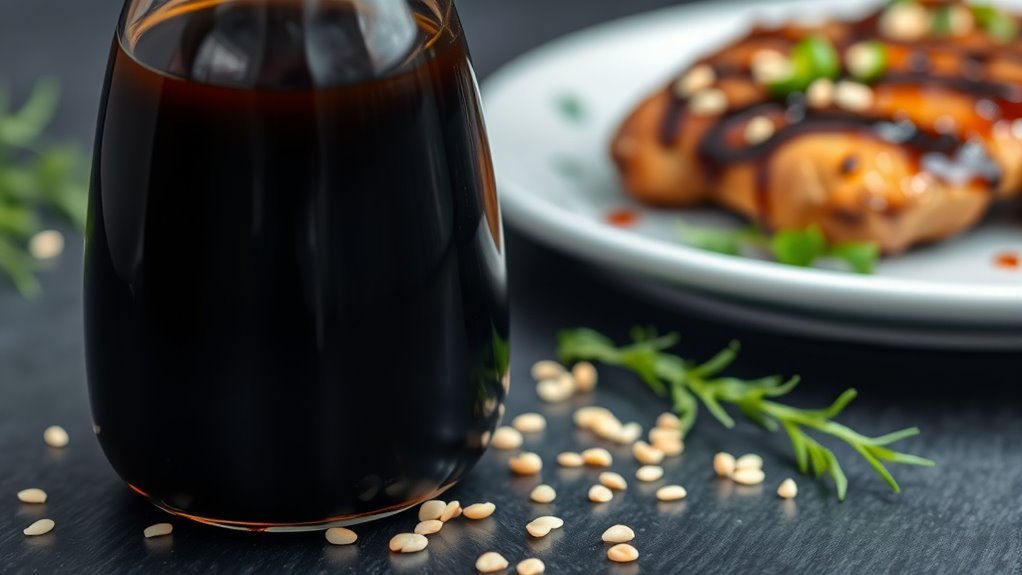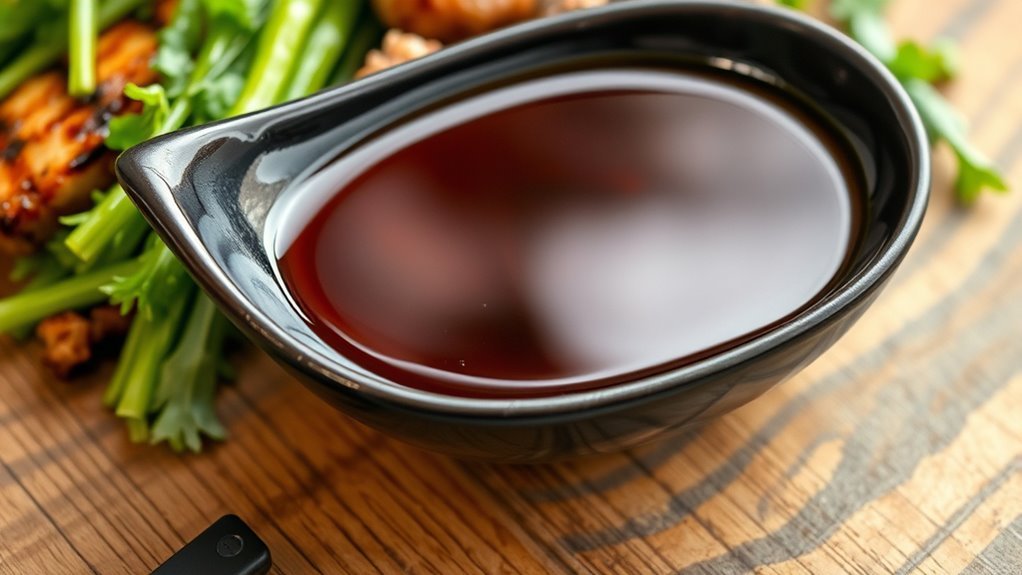Soy sauce can be keto-friendly in moderation, as it typically contains about 1 gram of carbs per tablespoon. However, watch out for hidden sugars in some brands, which can quickly add to your carb count. Low-sodium and gluten-free options like tamari and coconut aminos are great alternatives. Always check labels to avoid added sugars. By being mindful of your portions and choices, you can enjoy soy sauce while sticking to your keto diet. Discover more about suitable options and how to use them!
Understanding Soy Sauce and Its Ingredients

When you think of soy sauce, it’s likely the rich, savory flavor that comes to mind, but understanding its ingredients is essential, especially for those following a keto diet. Soy sauce is primarily made from fermented ingredients, including soybeans, wheat, salt, and water. The fermentation process creates complex flavor profiles, adding depth and umami to dishes. However, the presence of wheat can be a concern for those on a strict keto plan, as it contains carbohydrates. Some brands offer gluten-free options made from alternative fermented ingredients like coconut aminos, which can be a suitable substitute. By being mindful of the ingredients, you can enjoy soy sauce while staying aligned with your dietary choices, allowing for greater culinary freedom. Many store-bought options may contain hidden sugars that could impact your carb intake.
Nutritional Profile of Soy Sauce

When considering soy sauce in your diet, it’s important to look at its nutritional profile, particularly its carbohydrate and sodium content. Generally, soy sauce is low in carbs, making it a potential fit for a keto diet, but it’s also high in sodium, which can be a concern for those monitoring their salt intake. Understanding these factors can help you make informed choices about incorporating soy sauce into your meals. Additionally, low-sodium options can help manage salt intake while retaining flavor.
Carb Content Overview
Although soy sauce is often celebrated for its umami flavor, its nutritional profile, particularly its carbohydrate content, is essential for those following a keto diet. Typically, a tablespoon of soy sauce contains around 1 gram of carbohydrates, making it a low-carb option compared to other condiments. For individuals adhering to dietary guidelines that prioritize minimal carb sources, this makes soy sauce a suitable addition to your meals. However, it’s important to take into account the quantity used, as those grams can add up quickly if you pour it liberally. If you’re looking to maintain ketosis, moderation is key. By being mindful of your soy sauce intake, you can enjoy its flavor without compromising your keto goals. Additionally, traditional soy sauce is rich in antioxidants and amino acids, which can support muscle health and overall wellness.
Sodium Levels Explained
While soy sauce can enhance the flavor of your dishes, it’s important to be mindful of its sodium levels, especially if you’re on a keto diet. A typical serving of soy sauce contains around 1,000 milligrams of sodium, which can considerably contribute to your daily intake. For those focusing on sodium health, this can be a concern, as excessive sodium consumption may lead to increased blood pressure and other health issues. It’s vital to take into account soy sauce as one of many sodium sources in your diet. You might opt for low-sodium versions or use it sparingly to maintain your keto lifestyle without compromising your overall health. Balancing flavor with mindful consumption is key to enjoying soy sauce responsibly.
Carbohydrate Content in Soy Sauce

When considering soy sauce on a keto diet, it’s important to look at its carbohydrate content. Traditional soy sauce contains a moderate amount of carbs, which can add up quickly if you’re not careful. Fortunately, there are low carb alternatives available that can help you enjoy the flavor without compromising your dietary goals.
Nutritional Breakdown of Soy Sauce
Soy sauce, a staple in many cuisines, offers a unique flavor profile but also raises questions about its suitability for a ketogenic diet, particularly regarding its carbohydrate content. Typically, regular soy sauce contains around 1 gram of carbohydrates per teaspoon, making it relatively low in carbs. However, the nutritional benefits can vary by soy sauce varieties. For instance, tamari, a gluten-free option, has a similar carb count but may offer a richer taste. While it can enhance dishes without greatly impacting your carb intake, moderation is key. You’ll want to be mindful of portion sizes, especially if you’re tracking your macros closely on a keto diet. Keeping carb intake low while enjoying flavorful additions like soy sauce can help maintain your ketosis. Balancing flavor and dietary goals is totally possible with careful choices.
Low Carb Soy Sauce Options
If you’re on a ketogenic diet and looking for soy sauce alternatives with even lower carbohydrate content, there are several options available. One popular choice is coconut aminos, which contains about 1 gram of carbs per teaspoon compared to regular soy sauce, which can have up to 1 gram per tablespoon. Coconut aminos are also naturally lower in sodium, making them a heart-healthy alternative. Another option is low-sodium soy sauce, which reduces the salt content while offering a similar flavor profile. However, it’s essential to check the labels, as some brands may still contain added sugars. By exploring these alternatives, you can enjoy flavorful dishes without compromising your carb intake on a keto diet. Additionally, consider using homemade sauces to better control carbohydrate levels and flavor profiles.
Impact on Keto Diet
For those following a keto diet, understanding the carbohydrate content in soy sauce is important for maintaining your daily carb limits. Traditional soy sauce contains about 1 gram of carbs per teaspoon, which might seem low. However, those carbs can add up quickly if you’re not careful. If you’re looking for soy sauce alternatives, consider options like tamari or coconut aminos, which typically have fewer carbs and can still deliver that umami flavor you crave. You can also explore other ketogenic flavorings, such as liquid aminos, which offer a richer taste with minimal carbs. Ultimately, being mindful of portion sizes and exploring low-carb options will help you enjoy flavor without compromising your keto goals. Additionally, some low-carb bean alternatives can also provide flavor without significant carb content.
Hidden Sugars in Soy Sauce
When diving into the world of soy sauce, it’s easy to overlook the presence of hidden sugars that can impact your keto diet. Many soy sauce brands contain these hidden sugar sources, which can add unnecessary carbs to your meals. Here are three common culprits to watch out for:
- Wheat-based soy sauces – Often contain added sugars for flavor enhancement.
- Sweet soy sauces – Specifically crafted with sugar, making them unsuitable for keto.
- Low-quality brands – May use high fructose corn syrup, markedly increasing sugar content.
Being aware of these hidden sugars helps you make informed choices. Always check labels and opt for traditional or low-sugar soy sauce alternatives to stay on track with your keto goals.
Types of Soy Sauce: Which Is Best for Keto?
Which types of soy sauce can you enjoy on a keto diet without derailing your progress? When exploring the different soy sauces available, consider low-sodium soy sauce and tamari. Both options tend to have fewer carbs, making them better keto alternatives.
Here’s a quick comparison:
| Soy Sauce Type | Carbs per Tablespoon |
|---|---|
| Regular Soy Sauce | 1g |
| Low-Sodium Soy | 0.5g |
| Tamari | 1g |
Impact of Soy Sauce on Ketosis
Although soy sauce is often regarded as a flavorful addition to many dishes, its impact on ketosis can vary based on the amount consumed and the specific type used. Here are three key points to reflect on:
- Carbohydrate Content: Traditional soy sauce contains about 1 gram of carbs per tablespoon, which might fit into your daily limits, but be mindful of portion sizes.
- Soy Sauce Types: Some types, like tamari, may have lower carbs, while others could have added sugars, affecting your keto goals.
- Keto Substitutes: If you’re concerned about carbs, think about alternatives like coconut aminos, which are lower in carbs and can provide a similar taste. Additionally, incorporating high-quality protein sources like soybeans can help maintain energy levels while following a keto diet.
Alternatives to Traditional Soy Sauce
If you’re looking for soy sauce alternatives that align better with a keto lifestyle, there are several options worth considering. Coconut aminos is a popular choice; it contains fewer carbs and offers a slightly sweeter taste without the gluten found in traditional soy sauce. It’s made from the sap of coconut trees and is rich in amino acids. Another option is liquid aminos, which is derived from soybeans but has a lower carbohydrate content. While it still contains gluten, some people find it a suitable substitute for flavor. These alternatives not only help you stay within your carb limits but also provide unique flavors that can enhance your dishes, allowing you to enjoy your meals while adhering to your dietary preferences. Incorporating nutrient-dense snacks like sunflower seeds can further support your keto journey by adding healthy fats and essential nutrients.
How to Use Soy Sauce on a Keto Diet
When you’re incorporating soy sauce into your keto diet, it’s important to choose types that are lower in carbohydrates, like tamari or coconut aminos. Pay attention to serving sizes, as even small amounts can add up in carbs. Understanding these factors will help you enjoy soy sauce without compromising your keto goals.
Best Soy Sauce Types
Choosing the right type of soy sauce can greatly enhance your dishes while keeping you aligned with a keto diet. There are several soy sauce varieties, each offering unique flavor profiles that can elevate your meals. Here are three popular types to evaluate:
- Tamari: A gluten-free option that’s richer and less salty, making it perfect for dipping or marinades.
- Low-Sodium Soy Sauce: Ideal for those watching sodium intake, it provides a milder taste without compromising on flavor.
- Coconut Aminos: A soy-free alternative made from coconut sap, it’s slightly sweeter and lower in carbs.
Experimenting with these options can help you find the perfect match for your keto-friendly recipes while enjoying diverse flavors in your cooking.
Serving Size Considerations
Understanding serving sizes is essential for incorporating soy sauce into your keto diet without exceeding your carb limits. Soy sauce typically contains around 1 gram of carbs per tablespoon, making it relatively low-carb. To enjoy its flavor while maintaining portion control, consider using smaller amounts—like a teaspoon or half a tablespoon. This way, you can savor the taste without jeopardizing your daily carb allowance. When adding soy sauce to dishes, think about the total carb count of your meal, and adjust accordingly. Remember, it’s about balance; you can still enjoy your favorite flavors by being mindful of serving sizes. With thoughtful choices, soy sauce can be a delightful addition to your keto lifestyle. Additionally, keeping track of your daily carb intake is crucial for ensuring adherence to ketogenic guidelines and maintaining ketosis.
Tips for Choosing Keto-Friendly Condiments
While maneuvering the world of condiments on a keto diet, it’s essential to pay attention to their nutritional content. Here are some tips to help you choose wisely:
- Check Labels: Look for condiments with minimal sugar and carbs. Many store-bought options have hidden sugars; opt for keto-friendly mayonnaise or low carb dressings instead.
- Choose Whole Ingredients: Favor condiments with whole ingredients you recognize. Avoid those with artificial additives or preservatives that can derail your diet.
- Portion Control: Even keto-friendly options can add up. Use small amounts to enhance flavor without exceeding your carb limits.
- Understand Macronutrient Ratios: Being aware of the macronutrient breakdown in condiments can help you stay within your daily carb limits.
With these tips, you’ll enjoy your meals while staying true to your keto lifestyle!
Conclusion: Making Informed Choices With Soy Sauce
When it comes to incorporating soy sauce into your keto diet, it’s important to weigh the options available. While traditional soy sauce can fit, you might want to explore lower-sodium or gluten-free soy sauce varieties for a healthier choice. Always check the labels for added sugars, as some brands might sneak in carbs. When planning your keto meal pairings, consider using soy sauce to enhance flavors in stir-fries, marinades, or dressings without compromising your carb limits. Balancing taste and health is key. Remember, moderation is essential—enjoy the umami without overindulging. By making informed choices about soy sauce, you can savor its rich flavor while staying true to your keto lifestyle. Enjoy freedom in your culinary adventures!
Frequently Asked Questions
Can I Use Soy Sauce in Marinades on a Keto Diet?
You can definitely use soy sauce in marinades on a keto diet, but there’s a catch. Many soy sauces contain sugar, which could derail your macros. If you want to play it safe, consider marinade alternatives like coconut aminos or tamari, which are lower in carbs. These soy sauce substitutes maintain that savory flavor without compromising your keto goals. Experiment with different options and find what excites your taste buds while keeping you on track!
Is Low-Sodium Soy Sauce Better for Keto?
Low-sodium soy sauce can be a better option for you on a keto diet, as it offers the same flavor with reduced sodium benefits, which is helpful for managing blood pressure. However, if you’re looking for even fewer carbs, consider soy sauce alternatives like coconut aminos or tamari. These options can provide similar taste profiles while keeping your diet more balanced. Always check labels to verify they fit your dietary needs!
Does Soy Sauce Contain Gluten?
Yes, traditional soy sauce contains gluten, as it’s made from fermented wheat. If you’re looking for gluten-free alternatives, options like tamari or coconut aminos are excellent soy sauce substitutes. Tamari is typically brewed without wheat, making it a suitable choice for those on a gluten-free diet. Always check labels to confirm you’re choosing products that meet your dietary needs. Enjoy your meals without compromising on flavor!
Can Soy Sauce Affect My Weight Loss on Keto?
You’d think soy sauce would sabotage your weight loss on keto, but it could actually offer some benefits. While it’s low in carbs, moderation is key. A splash can enhance flavors without piling on calories, making your meals more satisfying. Just watch the sodium! If you’re mindful, soy sauce can fit into your keto lifestyle, potentially helping you stick to your plan and enjoy your food more. Balance is everything!
How Much Soy Sauce Can I Consume on a Keto Diet?
You can enjoy soy sauce in moderation on a keto diet, typically around one to two tablespoons per serving. Since soy sauce consumption is relatively low in carbs, it can fit within keto diet guidelines. However, be mindful of sodium levels, as too much can affect your health. Always check labels for added sugars and consider alternatives if you’re concerned about carbs or sodium. Balance is key to maintaining your keto lifestyle.
Frequently Asked Questions about Soy Sauce and Keto
1. Is soy sauce keto-friendly?
Yes, soy sauce can be considered keto-friendly in moderation. Traditional soy sauce is low in carbs, typically containing about 1 gram of carbs per tablespoon. However, it’s important to monitor your overall carbohydrate intake, as even small amounts can add up if consumed in large quantities or used in recipes with other carb-containing ingredients.
2. What are the nutritional components of soy sauce?
Soy sauce is primarily composed of water, soybeans, wheat, and salt. A typical serving of soy sauce (1 tablespoon) contains about 10 calories, 1 gram of carbohydrates, 1 gram of protein, and is low in fat. However, it does contain a significant amount of sodium, so those on a strict keto diet should consider their sodium intake as well.
3. Are there any alternatives to soy sauce for keto dieters?
Yes, there are several keto-friendly alternatives to soy sauce. Coconut aminos is a popular substitute that is made from the sap of coconut trees and is lower in sodium and carbs. Other options include tamari, which is a gluten-free variant of soy sauce, or liquid aminos, which is a protein-rich alternative. Always check the nutritional labels to ensure they fit within your dietary requirements.
4. Can I use soy sauce in marinade while on a keto diet?
Absolutely! Soy sauce can be a flavorful addition to marinades for meats and vegetables on a keto diet. Just be cautious about the other ingredients in your marinade. Avoid adding sugars or high-carb ingredients like honey or sweet sauces, and opt for keto-friendly spices and oils to maintain low carbohydrate levels.
5. How much soy sauce can I consume on a keto diet?
While soy sauce is low in carbs, moderation is key. A tablespoon or two is generally acceptable, but it’s important to consider your overall carbohydrate intake for the day. If you are close to your carb limit, you may want to use less or choose a different condiment. Always listen to your body and adjust your intake based on your personal dietary needs.
References
- https://www.ncbi.nlm.nih.gov/pmc/articles/PMC7010031/
- https://www.healthline.com/nutrition/keto-diet-food-list
- https://www.medicalnewstoday.com/articles/324118
- https://www.thekitchn.com/keto-friendly-soy-sauce-substitutes-22956186
- https://www.cdc.gov/nutrition/index.html
- https://www.bbcgoodfood.com/recipes/what-is-soy-sauce
- https://www.webmd.com/diet/obesity/features/what-is-the-keto-diet
- https://www.mayoclinic.org/healthy-lifestyle/nutrition-and-healthy-eating/in-depth/keto-diet/art-20460412


